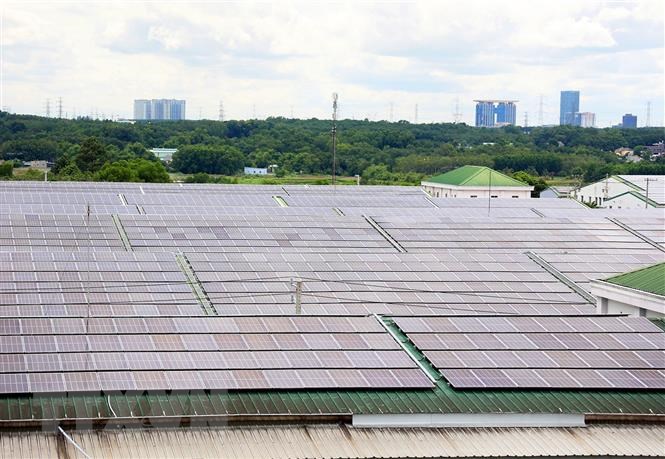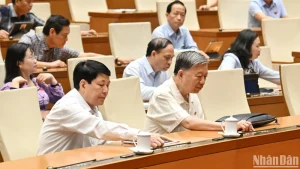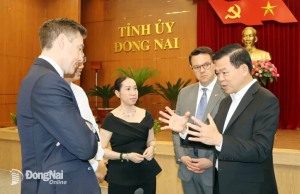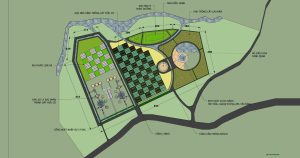The development of the circular economy aims to create impetus for innovation and improve labor productivity… contributing to achieving economic prosperity, environmental sustainability and social justice.
 With the circular breeding process, the pig farm of Trang Linh Co., Ltd., Xuyen Moc district, Ba Ria-Vung Tau solves the problem of post-breeding waste, and has an additional source of income. (Photo: Hoang Nhi/TTXVN)
With the circular breeding process, the pig farm of Trang Linh Co., Ltd., Xuyen Moc district, Ba Ria-Vung Tau solves the problem of post-breeding waste, and has an additional source of income. (Photo: Hoang Nhi/TTXVN) In order to assess the challenges and obstacles as well as propose policy contents for the circular economy in Vietnam in the coming time, on June 12, the Central Institute for Economic Management (CIEM) coordinated with the Central Institute for Economic Management (CIEM). With the Sustainable Economic Development Program, the German International Cooperation Agency (GIZ) in Vietnam organized the Forum “Building a pilot mechanism for the development of a circular economy in Vietnam.”
In the opening speech at the forum, Dr. Tran Thi Hong Minh, Director of CIEM said that Decision No. 687/QD-TTg in 2022 approving the project of circular economy development in Vietnam is one of the important efforts. The first priority is to determine the roadmap, requirements and orientation for the development of the circular economy in Vietnam.
“In order to realize benefits from the circular economy as soon as possible, creating incentives for businesses and investors to transform and create a circular economy model is of particular importance, especially for some industries and fields have great potential such as agriculture, industry, energy, building materials…,” emphasized Dr. Tran Thi Hong Minh.
[Circular economy towards the goal of greening economic sectors]
Mr. Nguyen Anh Duong – Head of the General Research Department, Central Institute for Economic Management, said that developing the circular economy aims to create a driving force for innovation and improve labor productivity. contribute to economic prosperity, environmental sustainability and social equity; towards a green, carbon-neutral economy and contribute to the goal of limiting global temperature rise.
However, Vietnam is also facing significant challenges in terms of resource depletion, environmental pollution and climate change. These challenges become complex in the context that Vietnam is also continuing the process of population growth and urbanization, and the process of industrialization, but it is still slow to transition from the traditional linear economic approach. increasingly serious consequences for resource supply, large amount of waste, environmental security and water source security.
 Solar batteries are used by many industrial parks, creating renewable and environmentally friendly energy sources.
Solar batteries are used by many industrial parks, creating renewable and environmentally friendly energy sources.
(Photo: Hong Đat/TTXVN)
These challenges require Vietnam to take a more serious look at the requirements of sustainable development, increase the level of independence and autonomy of the economy and the resilience of the supply chain…; in which, promoting the development of a circular economy model is one of the important solutions and directions in line with the orientation that many countries around the world are approaching and transforming.
According to Dr. Tran Thi Hong Minh, due to the circular economy associated with new design thinking, innovative applications and related to many different policy areas, the traditional and sequential approach to complete Relevant policy contents are necessary, but not sufficient.
In particular, the context of economic recovery of the country in general and serious difficulties for economic sectors (agriculture, industry, energy, construction materials) in the first months of 2023 in particular also require It is imperative to quickly create new impetus for businesses, investors and employees through policies to promote “green recovery.”
To create “vibration” for circular economy development policies, the traditional, sequential approach is not enough. The context of economic recovery needs more impetus from efforts to promote “green recovery.”
Accordingly, an important task to soon concretize these orientations is to develop a Decree on a pilot mechanism for circular economy development. This task is assigned to the Ministry of Planning and Investment to assume the prime responsibility and submit it to the Government in the second quarter of 2023.
The early formation of a solid legal basis for circular economy development will also help concretize contents of international cooperation related to circular economy (green energy transformation, agriculture, etc.) ). Accordingly, the content of developing a Decree on the pilot mechanism for circular economy development is an important requirement.
According to Mr. Nguyen Anh Duong, in resource-intensive economies, the transition towards a circular economy can offer many opportunities to pursue economic diversification and access higher-value markets.
Along with that, international cooperation plays a very important role in accessing, applying and mastering science-technology, innovation in circular economy development. Policies to support enterprises participating in the implementation of circular economy projects are essential.
According to Dr. Tran Thi Hong Minh, the goal of policy development is to give investors and businesses peace of mind early testing of circular economy ideas and initiatives, contributing to the process of green transition and green recovery in Vietnam.
With sharing, perspectives on the current situation, barriers and recommendations for appropriate policies for the development of the circular economy in Vietnam, CIEM hopes to soon propose an effective testing mechanism. to develop circular economy in the coming period; At the same time, it will synthesize, focus on research, propose and complete the Draft Decree to submit to the Ministry of Planning and Investment and the Government in the coming time./.
Source: Thuy Hien (TTXVN/Vietnam+)





Leave a reply